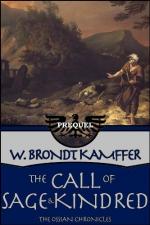|
This section contains 2,231 words (approx. 8 pages at 300 words per page) |

|
SOURCE: "James MacPherson, Ossian, and the Revival of Interest in Oral Bardic Traditions in Eighteenth-Century Scotland," in Midwestern Journal of Language and Folklore, Vol. VI, No. 1-2, Spring / Fall, 1980, pp. 51-5.
In the following essay, Grobman discusses the eighteenth-century rise in interest in Scottish oral tradition and notes that this focus helped to ensure the initial popularity of Macpherson's Ossianic poetry.
When Scotland lost its own Parliament by merging with the English Parliament on May 1, 1707, with the Treaty of Union, Scottish culture succumbed steadily to English influences. Scottish poets and musicians continued to leave for English cities, a process begun in 1603 when the departure of James VI for England forced court patronage of the arts to cease in Scotland. Yet Scottish national pride continued to grow, causing many poets and writers to resist anglicization stubbornly and turn to a regional, vernacular Scottish-Gaelic source of folk poetry.
A leading...
|
This section contains 2,231 words (approx. 8 pages at 300 words per page) |

|


